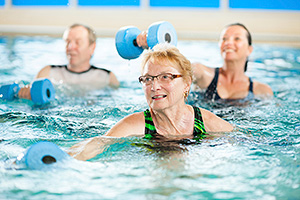Our Health Library information does not replace the advice of a doctor. Please be advised that this information is made available to assist our patients to learn more about their health. Our providers may not see and/or treat all topics found herein.
Topic Contents
Quick Tips: Exercising Safely With Arthritis
Getting Started

Talk to your physical therapist or doctor before you start an exercise program or activity. Ask what kind of exercise is best for you and how to exercise if a joint is sore or swollen. Also ask if you should take nonsteroidal anti-inflammatory drugs (NSAIDs) to make it easier for you to exercise and if you should use ice or heat after you're done exercising.
Exercise and activity can help arthritis. But a common symptom of arthritis is pain after activity, which may make you not want to exercise. Here are some tips to help you manage the pain and be sure that you don't hurt your joints when you exercise.
- Start slowly, and don't push yourself too hard.
Pace yourself. For example, do 10 minutes of activity at a time, 1 or 2 times a day. Then work your way up to where you can do it for a longer time or do the exercise with more effort. Aim for at least 2½ hours of moderate activity a week. One way to do this is to be active 30 minutes a day, at least 5 days a week. Pacing yourself is especially important if you haven't exercised for a while.
Ask which strength exercises would be best for you and how to do them safely so you don't get hurt. Exercise books, videos, and phone apps can also show you how to do strength exercises the right way.
- Manage your pain.
- You may want to take an over-the-counter pain medicine before you exercise. These medicines include NSAIDs, such as ibuprofen (Advil or Motrin) or naproxen (Aleve). Acetaminophen, such as Tylenol, may also help.
- If your joint pain gets worse after exercise, try using ice or heat on the joints that hurt. But don't use heat if the joint is swollen or hot.
- Use assistive devices that can help you do your daily activities with less stress on your joints.
- Sharp or unusual pain may be a sign of injury. Talk to your doctor or physical therapist if you have new pain or if your pain is a lot worse.
- If an activity makes you feel sore, try something else. Or change how you do the activity.
Here are some things you can try:
- Rest between each exercise or activity.
- Decrease your speed.
- If you like to walk or swim, go a shorter distance. You might take two or three short walks in a day rather than one long walk.
- Do a shorter workout, then rest and do a little more later.
- Lift less weight.
- Rest your joints when you need to.
Balance your exercise with rest and joint care. If your joints hurt or you have redness or swelling, rest your joints until your pain gets back to the level that is normal for you. Then exercise for less time or with less effort, or try another exercise that doesn't cause pain. For example, if your knees are swollen, don't use the stairs for a few days. Walk a shorter distance, and switch to swimming or riding an indoor bike.
Be sure you know when you have sore muscles, and not joint pain. If your muscles are sore, you can safely exercise through the soreness. (You could exercise through joint pain too, but it's not safe to do so.)
Related Information
Credits
Current as of: July 31, 2024
Author: Ignite Healthwise, LLC Staff
Clinical Review Board
All Ignite Healthwise, LLC education is reviewed by a team that includes physicians, nurses, advanced practitioners, registered dieticians, and other healthcare professionals.
Current as of: July 31, 2024
Author: Ignite Healthwise, LLC Staff
Clinical Review Board
All Ignite Healthwise, LLC education is reviewed by a team that includes physicians, nurses, advanced practitioners, registered dieticians, and other healthcare professionals.
This information does not replace the advice of a doctor. Ignite Healthwise, LLC disclaims any warranty or liability for your use of this information. Your use of this information means that you agree to the Terms of Use and Privacy Policy. Learn how we develop our content.
To learn more about Ignite Healthwise, LLC, visit webmdignite.com.
© 2024-2025 Ignite Healthwise, LLC.




